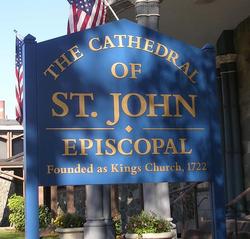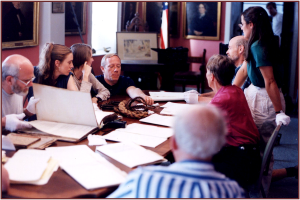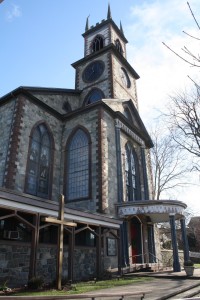A museum dedicated to the slave trade in a cathedral in Providence, R.I.
Posted November 17th, 2014 by James DeWolf PerryCategory: Public History Tags: Episcopal Church, James DeWolf, Providence, Rhode Island, Slave trade, Traces of the Trade
 The Tracing Center is excited to be part of a growing movement to transform much of the Episcopal cathedral in Providence, R.I. into a museum on the history of the slave trade and a center for racial reconciliation and healing.
The Tracing Center is excited to be part of a growing movement to transform much of the Episcopal cathedral in Providence, R.I. into a museum on the history of the slave trade and a center for racial reconciliation and healing.
This effort, which recently received the blessing of the Episcopal Diocese of Rhode Island, is outlined in an article by Paul Davis in today’s edition of the Providence Journal.
The Cathedral of St. John in Providence is in many ways a fitting location for a public space dedicated to interpreting the history of the slave trade and to addressing the legacies of this history today.
Uncovering Rhode Island’s role in the slave trade
The information in this section will be familiar to many of our regular readers, but is important background on the cathedral project for those who are new to the history of the slave trade in Rhode Island or to the work of our organization and others in educating about this history.
Rhode Island was the epicenter of the U.S. slave trade, with more than 1,000 slaving voyages (or about 58% of the U.S. total) departing from Providence, Bristol, Newport, or other seafaring towns along the Rhode Island coastline. As Episcopal Bishop Nicholas Knisely of Rhode Island said at the diocesan convention earlier this month, “much of Rhode Island’s economy was built with the profits of that trade.”
At the heart of the Rhode Island slave trade was James DeWolf, the leading slave trader in the nation’s history. James DeWolf and the extended DeWolf family together brought more than 10,000 enslaved Africans across the Middle Passage, a business which DeWolf exploited to become speaker of the Rhode Island House of Representatives and a United States senator, as well as the second-richest man in the country.
Yet until the last few years, relatively few people knew anything about the scope of Rhode Island’s involvement in the slave trade … or, for that matter, about the complicity of the North in slavery as a whole.
 One shift in public awareness began when descendants of the DeWolf slave traders, including me and a distant cousin, Katrina Browne, came together to reveal our family’s hidden history. Katrina began this process, producing and directing Traces of the Trade: A Story from the Deep North, an award-winning 2008 documentary film about the DeWolf family history and its contemporary legacy, which premiered at the Sundance Film Festival and aired nationwide on PBS. That same year, family member Tom DeWolf published his memoir, Inheriting the Trade: A Northern Family Confronts Its Legacy as the Largest Slave-Trading Dynasty in U.S. History, about being one of ten of us to make the journey across the Triangle Trade depicted in Traces of the Trade and to explore the implications of our family’s history in the public eye.
One shift in public awareness began when descendants of the DeWolf slave traders, including me and a distant cousin, Katrina Browne, came together to reveal our family’s hidden history. Katrina began this process, producing and directing Traces of the Trade: A Story from the Deep North, an award-winning 2008 documentary film about the DeWolf family history and its contemporary legacy, which premiered at the Sundance Film Festival and aired nationwide on PBS. That same year, family member Tom DeWolf published his memoir, Inheriting the Trade: A Northern Family Confronts Its Legacy as the Largest Slave-Trading Dynasty in U.S. History, about being one of ten of us to make the journey across the Triangle Trade depicted in Traces of the Trade and to explore the implications of our family’s history in the public eye.
Then in 2009, Katrina and I, along with Juanita Brown, the film’s African American co-producer, founded the Tracing Center on Histories and Legacies of Slavery, an organization dedicated to fostering public education about the complicity of the entire nation in slavery, facilitating public dialogue about the legacy of that history, and promoting racial reconciliation and healing based on greater awareness of this history. In the five years since the Tracing Center was founded, we have led programs at venues such as United Nations headquarters in New York and on Capitol Hill for members of Congress and their staff, and more importantly, at hundreds of schools and universities, museums and historic sites, and churches and civic centers across the United States. Next month, Rowman & Littlefield is scheduled to publish our first book, Interpreting Slavery at Museums and Historic Sites (co-edited by Kristin L. Gallas and James DeWolf Perry; December 2014), which aims to help our nation’s public history institutions better convey the nuances and complexities of this history with compassion and sensitivity.
The combination of our efforts, as well as that of a growing number of scholars, journalists, and others committed to bringing the nation’s full role in slavery to light, has begun to increase public awareness of this history, especially in the state of Rhode Island.
The Episcopal Church and the slave trade
For several years, the Episcopal Church has been at the forefront of efforts to uncover the historic complicity of our nation’s institutions in slavery and the slave trade. We have been honored to join in efforts by black Episcopalians and their allies to press for accountability within the Church in a variety of ways.
In 2006, we took a “rough cut” of Traces of the Trade to the Episcopal Church’s General Convention in Columbus, Ohio. This helped contribute to the adoption of resolutions acknowledging and apologizing for the Church’s historic complicity in slavery and calling upon all dioceses of the Church, throughout the nation, to document the Church’s complicity in slavery and the economic benefits it derived from that complicity. The Church later endorsed the use of Traces of the Trade, and facilitated dialogues based on the film, as a means of exploring issues of race and privilege, both historically and today. DeWolf family member Dain Perry and his wife, Constance Perry, have been especially active in advancing these efforts in Episcopal Church settings.
Also in 2006, Katrina was invited to preach at St. Michael’s Church in Bristol, R.I., where many of the slave-trading DeWolf family were practicing Episcopalians in the late 1700s and early 1800s. The Rev. David Dobbins and the Ven. Janice Grinnell of St. Michael’s were moved by the sermon Katrina gave during the filming to initiate a spontaneous healing ritual during the service. This became the final scene in the film. Over the years, David and Jan have remained conscious of the need to continue to implement the process outlined in the 2006 resolutions within the Diocese of Rhode Island. Jan became the diocese’s archdeacon in 2013, and when Bishop Knisely issued a call for ideas to reimagine the cathedral, she and David conceived the idea for a museum and reconciliation center. They convened a diverse group of Rhode Islanders to explore the concept, which has grown and flourished from that beginning.
In Rhode Island, the Episcopal Church’s complicity in slavery and its economic benefits were especially stark. As Bishop Knisely notes:
The ship building and shipping industry in Rhode Island were major players in the slave trade and much of Rhode Island’s economy was built with the profits of that trade. Many … of those businesses were owned and operated by Episcopalians. So we feel we have both an obligation and an opportunity to speak the truth about the church’s role in the slave trade.
Of course, the Episcopal Church is not unique in having historic ties to slavery, nor in having wealthy benefactors who made fortunes in slavery or the slave trade. In Providence, Brown University embarked several years ago on its own process of discernment and atonement for its historic dependence on the slave trade, a process which culminated in, among other concrete steps, the establishment of a new Center for the Study of Slavery and Justice, which, along with the Tracing Center, is a partner in the cathedral project. Nor is this institutional complicity limited to Rhode Island: other religious denominations in the U.S. have been exploring their historic ties to slavery in recent years, as have other colleges and universities. For a scholarly analysis of the latter history, see Craig Steven Wilder, Ebony & Ivy: Race, Slavery, and the Troubled History of America’s Universities (New York: Bloomsbury Press, 2013).
The ties of the Cathedral of St. John to slavery and the slave trade
 The Cathedral of St. John began its existence as an ordinary church. The congregation of King’s Church in Providence included slave owners, and church records show that enslaved persons were routinely baptized there.
The Cathedral of St. John began its existence as an ordinary church. The congregation of King’s Church in Providence included slave owners, and church records show that enslaved persons were routinely baptized there.
King’s Church became the cathedral of the Episcopal Church in Rhode Island in 1929, under the leadership of then-Bishop James DeWolf Perry. As his name suggests, Bishop Perry (who would later become the head of the national Episcopal Church) was a direct descendant of James DeWolf, the notorious slave-trader, as well as my own great-grandfather.
Thus the Cathedral of St. John is inextricably linked with the history of the DeWolf slave trade and with the broader history of the slave trade in Rhode Island. This, surely, makes the choice of the cathedral an ideal one for housing a museum dedicated to interpreting the history of the slave trade, and especially for functioning as a center for scholarly and community activities devoted to addressing the legacy of this history and to seeking reconciliation and justice for those impacted by this history today.



November 17th, 2014 at 8:57 pm
“Kudos” to the time, research, life-long commitment by the DeWolf Slave descendants for making this Mission into a Reality. As a descendant of a Slave, who is holding me as an infant, I feel much pride in knowing such recognition is Being made to our ancestors, as I someday hope all “Slave States” will, someday, emulate by honoring our forebearer’s “blood and bones” which are a whole part of the creation of this Nation….Well Done, Salute and Respect to Our History. Please ket ne know of any “grand openings, etc”
James and the City of Providence, Yours in the Struggle, Stella for the Slave
November 18th, 2014 at 6:01 pm
With Humble Honor, Esteemed Resolve and Saddened Appreciation, for admitted atrocities done to a People by a People, I pen this note on behalf of a former Slave who could not write, so I write for her to the DeWolf Family, both the African-American DeWolfs, the Descendants of Slaves, and the Caucasian DeWolfs who were one of the largest Slave-owners responsible for at least 50% of the crimes against nature and the violation human rights, of kidnapping, murder and other atrocities, especially enslavement, and the Diaspora of Africans which came through Providence, R.I., “dubbed… the “Deep North” and recently documented and written about by one of the Black DeWolfs, all, too, amazing and shocking when looking at the sheer number of enslaved, captured, Africans (some 10,000 owned by the White DeWolfs, alone, whose financial bedrock of their family fortune, from Slavery, making them the Second Richest Family in American, at that time.
l am writing to commend both families, on behalf of one of those Slaves, my Great,Great Grandmother, Charlotte McClee, who lived to be 111 years of age …she held me as an infant, in a rare Slave’s Five Generations of her children’s, children’s, children, born into “Freedom”…..I’m sure she’d want me to acknowledge these newly documented, lost pages of unknown facts about the huge part the ‘Deep North,” played, in particular, the DeWolfs and the City Of Providence as an epi-center, catalyst and facilitator for the Institution of Slavery, in, both, the North and the South; and, for delving into these facts by researching into our lost African-Slavery History as it pertains to Slavery in the “Deep North.”
These revelations, I feel, lend much to the need for all Slave States, in this Country, to Issue a formal “Apology for Slavery,” as the Connecticut Legislature, recently did….”All things Old Must Be Made New Again” before the long awaited healing process can begin. To the Rhode Island DeWolfs and the City of Providence, you have begun this healing process, I feel, the Slave would want me to say. I salute the new Slavery Artifacts Museum, in Providence, and for efforts of contrition being shown, by Providence, as a first step in an arduous, over 450 years of our ignored, African Slavery History, unwritten, until now, in the annals of time. These “words” of copibility must be followed by “actions” pursuant to the words being commensurate to the Deeds by way of a USA Federal “Apology” for Slavery with Atonement and Reparation, being an integral part of the discussion. I Believe, I Speak for the Slave. Again, this is a monumental Black History, First…”History in the Making” Moment! I’m elated to be a part of it and lived to witness.
On behalf of the Slave Thank you, again, the DeWolfs of Providence, R.I., for all of your hard work and due diligence, on behalf of all African-Americans and all Slaves!
Stella for the Slave
November 28th, 2014 at 3:51 pm
I write to congratulate all those who have initiated this effort. I speak as descendant of this sad history. My family was a long time Rhode Island people. From what I know my people came to this state circa 1880. I am also an ordained priest 1967-68. deacon and priest. My brief time was as a curate for St. Martin's Providence. At that
time a man named Halsey DeWolf Howe was rector. I stayed with him and that parish for about two years. Since then until now I have served the Church in the NYC area. At the time I knew Halsey was from a famous family.
I did know about the slavery connection. However, I want to say that Fr. Howe was a wonderful first rector and always treated me with respect. I remember him, his family, and St. Martin's well. May God bless the efforts that
will housed at St. John' Cathedral. We certainly such after the frightful recent developments in our nation
December 3rd, 2014 at 12:05 pm
I commend the Diocese for taking the action to turn the Cathedral of St. John into such a museum. I too am a descendant of slaves….with a family history that goes back — that I can document — more than seven generations in Rhode Island and the surrounding area. I'm more than pleased to see that my cousin, Fr. Blunt has put up a post…. it's time that history right itself.
February 18th, 2015 at 9:17 pm
We thank the Lord for your establishment of a museum dedicated to the slave trade in a cathedral in St. John Cathedral in Providence, R.I.
The "18th of June" has been established as the National Day of Reconciliation and Healing from the Legacy of Enslavement (www.NationalDayofReconciliation.com). The day is followed by the celebration of freedom from enslavement on the "19th of June," Juneteenth Independence Day.
We now have 43 states, including Rhode Island, that recognize Juneteenth as a state holiday or special day of observance. These states join the District of Columbia and the U.S. Congress in the celebration of America's second Independence Day.
2015 is the 150th year anniversary of Juneteenth. We are requesting that President Obama, the U.S. Senate and the U.S. House of Representatives work together in the passage of legislation to make Juneteenth Independence Day a National Day of Observance, like Flag Day or Patriot Day, for the purpose of reconciliation and healing from the legacy of enslavement.
We invite you to join us in the recognition of the National Day of Reconciliation and Healing from the Legacy of Enslavement on the "18th of June" each year.
We also recognize the World Day of Reconciliation and Healing from the legacy of Enslavement on the "20th of August" (www.WorldDayofReconciliationandHealing.com). The date commemorates the date the first slave ship, the "White Lion" landed at Old Point Comfort, Fort Monroe, in Hampton, VA, with twenty Angolans in 1619.
We look forward to celebrating Juneteenth together and your participation in the National and World Days of Reconciliation and Healing from the Legacy of Enslavement.
March 13th, 2020 at 12:46 am
As a young man enlisted in the service of this country ‘America’ at the Quonset point naval air station had little to no knowledge of the awesome history of slavery in Providence Rhode Island’s history. My time spent in this state was a time of transition and enlightenment finding the peoples whom I met to be most delightful in character and spirit. It’s only fitting that a people of such character would acknowledge and repent for past behavior that has allowed them to benefit so greatly from past atrocities. I salute you and look forward to your support in finding a fitting resolve for such behavior ‘ MY GOD BLESS YOU’ .